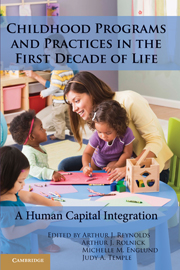Book contents
- Frontmatter
- Contents
- Contributors
- Foreword: The Essential Role of Youth Development by Robert H. Bruininks
- Acknowledgments
- 1 Early Childhood Development and Human Capital
- PART I PRENATAL AND INFANT PROGRAMS
- 2 WIC Turns 35: Program Effectiveness and Future Directions
- 3 The Nurse-Family Partnership: From Trials to Practice
- 4 Carolina Abecedarian Project
- 5 Early Head Start Impacts at Age 3 and a Description of the Age 5 Follow-Up Study
- PART II PRESCHOOL EDUCATION
- PART III KINDERGARTEN AND EARLY SCHOOL-AGE SERVICES AND PRACTICES
- PART IV ECONOMIC SYNTHESES OF EARLY CHILDHOOD INVESTMENTS
- Appendix Question-and-Answer Sessions
- Name Index
- Subject Index
- References
4 - Carolina Abecedarian Project
Published online by Cambridge University Press: 05 June 2012
- Frontmatter
- Contents
- Contributors
- Foreword: The Essential Role of Youth Development by Robert H. Bruininks
- Acknowledgments
- 1 Early Childhood Development and Human Capital
- PART I PRENATAL AND INFANT PROGRAMS
- 2 WIC Turns 35: Program Effectiveness and Future Directions
- 3 The Nurse-Family Partnership: From Trials to Practice
- 4 Carolina Abecedarian Project
- 5 Early Head Start Impacts at Age 3 and a Description of the Age 5 Follow-Up Study
- PART II PRESCHOOL EDUCATION
- PART III KINDERGARTEN AND EARLY SCHOOL-AGE SERVICES AND PRACTICES
- PART IV ECONOMIC SYNTHESES OF EARLY CHILDHOOD INVESTMENTS
- Appendix Question-and-Answer Sessions
- Name Index
- Subject Index
- References
Summary
HISTORY OF THE PROGRAM/POLICY
The Abecedarian study was designed to learn the extent to which an early childhood intervention program might prevent progressive developmental retardation among children born into poverty. Forty years ago, cross-sectional examinations of the cognitive development of children from poor families indicated that their cognitive test scores tended to be within the average range in infancy, but that disproportionate declines occurred after that period (Ramey, 1971). A particularly striking cross-sectional graph charted this kind of progressive decline in intellectual test performance among children born to mothers who themselves had low IQs (Heber, Dever, & Conry, 1968). Because at that time no biologically based etiology for most cases of mild retardation had been identified, many scientists believed that early “social deprivation or environmental deprivation” was implicated in the development of this condition. It followed that intervening to improve the intellectual stimulus value of the environment might prevent or ameliorate the disorder.
Largely based on animal research, evidence mounted that early experience supported development in ways that were critical for later functioning (e.g., Hunt, 1961). More to the point, this line of reasoning was supported by human-subject research conducted by Skeels and his colleagues (1938) in which one group of infants reared within institutions showed dramatic gains in developmental abilities when they were given the kinds of affectionate attention and handling not experienced by others from the same orphanage.
Information
- Type
- Chapter
- Information
- Childhood Programs and Practices in the First Decade of LifeA Human Capital Integration, pp. 76 - 98Publisher: Cambridge University PressPrint publication year: 2010
References
Accessibility standard: Unknown
- 8
- Cited by
